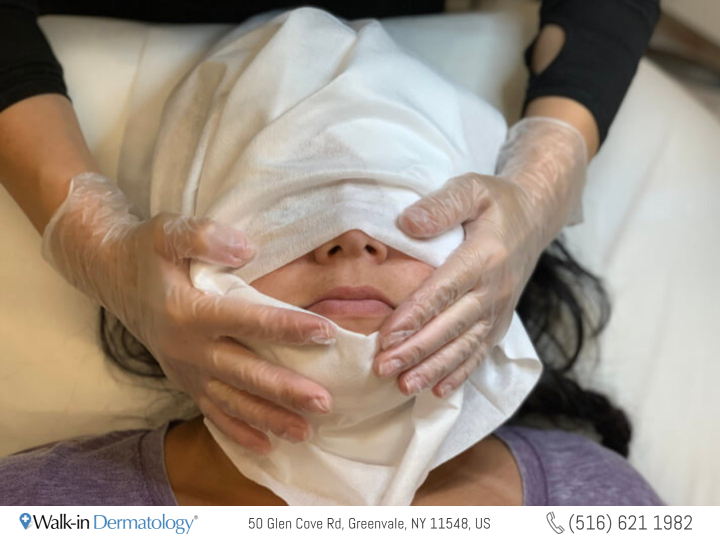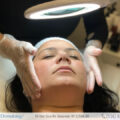Tues: 8:30am - 3:00pm
Wed: 12:00pm - 6:00pm
Thurs: 8:30am - 3:00pm
Fri: Closed
Sat: 8:30am - 12:30pm
Sun: Closed
Greenvale, NY 11548
How Does Lack of Sleep Affect the Skin?


Our bodies depend on a good night’s sleep for rest and recovery from the stressors of the day. Because the skin is the largest organ of the human body (covering an average of 20 square feet), sleep is vital for healthy skin. Without regular, quality sleep, many people begin to notice an increase in fine lines, uneven pigmentation and reduced elasticity in their skin. Simply put, they look older than their actual years would indicate because lack of sleep weakens the skin’s ability to repair and rejuvenate itself.
The American Academy of Sleep Medicine reports that about 30 percent of adults in the U.S. regularly do not get enough sleep.
During eight hours of sleep our bodies go through three distinct stages that contribute to our overall well being – and aid in the nightly restoration of our skin.
In the first three hours of sleep the pituitary gland produces somatotropin, the human growth hormone. This hormone contributes to the maintenance of youthful and healthy skin. Without somatotropin your skin does not repair as well from day to day. Inadequate somatotropin accelerates the aging process.
Production of the hormone melatonin increases during the next two hours of sleep. Melatonin works as an antioxidant that helps protect the skin from damaging free radicals (unstable atoms that cause illness and aging).
During the final stage known as REM sleep (Rapid Eye Movement), your cortisol levels begin to decrease along with skin temperature. Cortisol is a stress hormone. As the skin cools, our muscles relax and collagen production increases. Collagen is a protein found throughout the body. It makes skin more supple and smooth, easing out fine wrinkles. Good sleep that promotes collagen production allows the skin to make its strongest recovery of the night.
Let’s take a closer look at what’s going on while we sleep and the specific problems that develop from a lack of sleep.
Dry Skin
We naturally perspire more while we sleep. It’s the body’s way of rebalancing hydration levels by producing extra perspiration on the skin while we’re sleeping. This is a natural moisturizer that helps smooth out wrinkles. Lack of sleep also lowers your PH levels, which can also cause dry skin.
Dull Skin
Inadequate sleep raises your cortisol levels. This hormone triggers inflammation, which breaks down the proteins that keep your skin smooth and glowing. Inflammation can also make your skin more prone to acne and more sensitive to allergic reactions.
Also, if you are tired from lack of sleep, that can cause your blood circulation to work less efficiently. The result is lower oxygen in the blood, and that can make your skin appear blotchy, pigmented and grayish.
Dark Circles Under the Eyes
Blood vessels dilate from lack of sleep, causing those telltale dark circles and puffiness below the eyes. It’s different from bruising caused by an injury or redness and swelling in one eye caused by an infection. In some cases, dark circles are caused by an iron deficiency, typically a sign that not enough oxygen is flowing in the bloodstream to the body tissues. This is often due to sleeplessness. When we sleep, the blood flow increases throughout our bodies, aiding skin rejuvenation.
Iron and Vitamin C supplements may help reduce the pigmentation causing the discoloration below the eyes.
Although dark circles under the eyes usually aren’t a medical problem, many people would consider them a cosmetic problem. They don’t look good.
Dark circles can be concealed with over-the-counter creams, but for lasting results, the Mayo Clinic recommends seeing a dermatologist for advice.
Depending on what’s causing the circles under your eyes, a dermatologist can recommend prescription creams or a combination of treatments to eliminate or reduce discoloration. Laser therapy or chemical peels can be helpful in some cases. Hollows causing shadows can be smoothed with injectable fillers, and surgery can eliminate puffy lids.
But trying to get a good night’s sleep ought to be the first step in eliminating dark circles under the eyes.
Collagen and the Aging Process
When you don’t get enough sleep, stress begins to increase in your body as it struggles to regain hormonal balance. Chronic stress damages collagen in your skin. Collagen is a vital protein made of amino acids. It gives structure and elasticity to the skin. As collagen breaks down, your skin is no longer as firm and smooth.
What Can You Do About It?
- Get some rest. The first thing to do is create a bedtime routine and stick to it. If you decide to hit the pillow at 10 p.m., go to bed every night at that hour.
- Strive for 7 to 9 hours of sleep every night.
- Go easy on alcohol and tobacco before bedtime.
- Keep a glass of fresh water on your bedside table to stay hydrated.
- Don’t bring your electronics, such as a smartphone, into the bedroom. There’s less temptation to pick up the phone and start scrolling if you should awaken in the middle of the night.
- Most people find that quality, high thread-count sheets are more comfortable, which is what you want to be while sleeping.
- Elevate your head with an extra pillow or bed wedge. This reduces snoring, acid reflux and nasal drip – all of which can limit the quality of your sleep, which affects the appearance of your skin.
- Wash your face with a gentle cleanser to remove oils, dirt and all makeup before bedtime. Cosmetics may keep your skin from breathing while you sleep.
- Finally, apply a moisturizer about 15 minutes before turning in for the night. Your dermatologist can help you pick the right moisturizer for your skin type.
Lots of products promise the Fountain of Youth, but before you stock up on beauty merchandise to combat a tired appearance, first try antioxidants such as green tea and Vitamin C, which can help with overnight skin rejuvenation when taken regularly.
Anti-aging serums and eye creams may help, but let these ointments absorb into your skin for about 15 to 20 minutes before going to bed. This gives them a chance to work, rather than merely rubbing off on the pillowcase.
Remember, inadequate sleep accelerates the aging process. During deep sleep, growth hormones help damaged skin cells repair. When you don’t get enough sleep, the daily breakdown in your skin doesn’t get a chance to repair overnight. Over time this can lead to more visible signs of aging.
Getting the Best Skin Treatment to Reduce Signs of Aging
You don’t have to look far for excellent dermatology services – including therapies that roll back the clock on aging skin. Best of all, now there’s no waiting.
In many parts of New York and throughout the country, patients often wait weeks before they can see a board-certified dermatologist and receive a diagnosis, much less actual treatment.
That’s now a thing of the past.
At Walk-in Dermatology, patients can see a board-certified dermatologist seven days a week. Our dermatologists will evaluate your skin and answer all your questions. We will work with you to set up a skin treatment plan convenient to your schedule.
No more waiting days or even weeks to receive treatment. Walk-in Dermatology is here to serve you. We are open and ready to help you regain healthy skin that positively glows with a youthful look.
Learn more: Can Stress and Anxiety Affect Your Skin?








